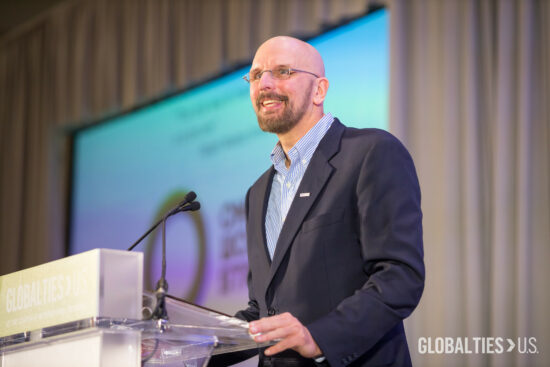Interview by Mary Yntema, CEO & President of WorldBoston

Photo credit: A.E. Landes Photography
*Editor’s note: Dave Fortier was nominated by Sarah Sibley, Vice President of Citizen Diplomacy at WorldBoston, a Global Ties U.S. Community-Based Member. She also recorded this interview.
Mary (M): Where are you from? How did you get involved with citizen diplomacy programs?
Dave (D): I am from Newburyport, MA, and became involved through WorldBoston. Sarah called me about a group from Manchester, UK, in December 2017 and asked me to join meetings at Boston City Hall. I didn’t understand what it was about until I met the group and realized the connections that we can make through IVLP groups coming through Boston.
M: How did you get the idea to start the One World Strong Foundation (OWS)?
D: It was precipitated by the Boston Marathon bombing [in 2013] and what we saw with the cities and countries coming together to support the victims. When the Marines of the Semper Fi Fund (veterans of the Iraq and Afghanistan wars) came to visit us in hospitals and rehab centers, I realized that something special was happening – a bond that forms almost instantly when victims of similar forms of trauma come together.
We were looking for a way to say thank you, so we came up with a cross-country trek to meet people throughout the country who had contributed money and in-kind donations to those impacted in the bombings here in Boston. One of our first stops was Newtown, CT (site of the Sandy Hook Elementary School shooting in 2012). We were supposed to be there for about 45 minutes in the morning for a run. We got to meet kids at the school and parents who had lost their children – we ended up staying until 2 a.m. the next day. It turned into relationships and we are still in touch.
Then we went to New York City, the White House, and Chicago. We were in Chicago when the Pulse Night Club attack occurred in Orlando, FL in June 2016. In less than a week, we were in Orlando visiting folks in the hospital and rehab centers. We were trying to build something to help those impacted by terrorist and extremist attacks, but we weren’t sure what it would be; we knew this organization had to be for everybody, without regard to race, religion, ethnic background, color, or politics. Orlando made us realize that we had to build it somewhere and it needed to be international. We continued to work informally like this until the middle of 2017 when we filed paperwork to become the OWS Foundation.
M: This work clearly speaks to a lot of people and situations. How does citizen diplomacy fit in?
D: I didn’t know a platform like the IVLP existed. I looked out the plane from Orlando thinking I have no idea where to start. The bells and whistles started going off when WorldBoston invited me to City Hall on a dreary, rainy day to meet with a group from Manchester, UK. I had never interacted with Global Ties U.S. or the U.S. Department of State prior to that. The more I learned about WorldBoston and the IVLP, the more I realized that we had to connect. Prior to WorldBoston, it was like trying to do a combination lock with your eyes closed in finding the proper connections in cities impacted by terrorist attacks; now it’s not.
M: What does this award mean to you?
D: First of all, it’s an honor because of the reach of your work. But also, it’s a start. I feel like a member and that I can do something meaningful with like-minded people. I know this is helping and I can see it, versus feeling like we’re searching in a black hole.
M: Have any international visitors you’ve met helped you and OWS?
D: Some yes, some no. This all comes through the citizen diplomacy space and working through our embassy network. Without that, I don’t see OWS’ work growing. For example, a participant on an IVLP program to Boston from Nigeria connected me to his network of students who have been impacted by terrorism in Nigeria. Now we have 60 people in the One World network in Nigeria [even though] we’ve never been to Nigeria!
M: What’s next for OWS?
D: Continuing to grow the networks we have. Capacity is our issue right now — we don’t have time to add information into our CRM, do scheduling, or social media. We want to build the Foundation in such a way that we are growing and telling/sharing stories at the same time, and be sustainable.
Another piece for OWS is working with “formers” (former terrorists and supporters). In February, we’ll be meeting with the Department of Homeland Security (DHS) and talking with formers to engage with survivors to create these stories. I see that when I speak at schools with formers, kids are listening. They’re not on their phones. It’s about the ability to share that message and make a positive impact.
M: You talk about “peer to peer humanitarian diplomacy.” What does it mean?
D: It’s a type of citizen diplomacy. It’s simply people connecting with people who have a common bond through trauma. If we can provide people the ability to move through their individual healing process more efficiently and effectively, then we are a positive piece of the bigger puzzle in helping others recover and move toward in their new normal.
Read more online about Dave and why he was nominated and selected for the award.
Watch his acceptance speech from the Global Ties U.S. 2020 National Meeting here
